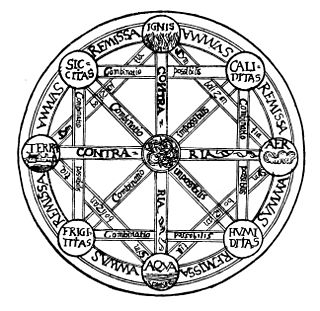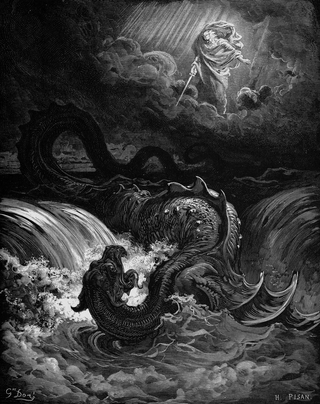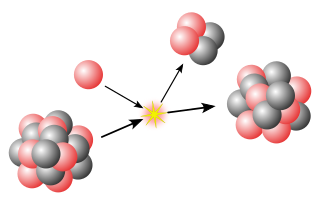
The classical elements typically refer to earth, water, air, fire, and (later) aether which were proposed to explain the nature and complexity of all matter in terms of simpler substances. Ancient cultures in Greece, Angola, Tibet, India, and Mali had similar lists which sometimes referred, in local languages, to "air" as "wind", and to "aether" as "space".
Titan most often refers to:

Nucleosynthesis is the process that creates new atomic nuclei from pre-existing nucleons and nuclei. According to current theories, the first nuclei were formed a few minutes after the Big Bang, through nuclear reactions in a process called Big Bang nucleosynthesis. After about 20 minutes, the universe had expanded and cooled to a point at which these high-energy collisions among nucleons ended, so only the fastest and simplest reactions occurred, leaving our universe containing hydrogen and helium. The rest is traces of other elements such as lithium and the hydrogen isotope deuterium. Nucleosynthesis in stars and their explosions later produced the variety of elements and isotopes that we have today, in a process called cosmic chemical evolution. The amounts of total mass in elements heavier than hydrogen and helium remains small, so that the universe still has approximately the same composition.
Flashback(s) or Flash Back may refer to:

Chaos is the mythological void state preceding the creation of the universe in ancient near eastern cosmology and early Greek cosmology. It can also refer to an early state of the cosmos constituted of nothing but undifferentiated and indistinguishable matter.
A black hole is a region of extreme gravitational pull.
Hydra generally refers to:
Generally speaking, Buddhism is a religion that does not include the belief in a monotheistic creator deity. As such, it has often been described as either (non-materialistic) atheism or as nontheism, though these descriptions have been challenged by other scholars, since some forms of Buddhism do posit different kinds of transcendent, unborn, and unconditioned ultimate realities.
Cosmic ray spallation, also known as the x-process, is a set of naturally occurring nuclear reactions causing nucleosynthesis; it refers to the formation of chemical elements from the impact of cosmic rays on an object. Cosmic rays are highly energetic charged particles from beyond Earth, ranging from protons, alpha particles, and nuclei of many heavier elements. About 1% of cosmic rays also consist of free electrons.
Air is the name given to the atmosphere of Earth.
Zeus is a Greek god, the ruler of Mount Olympus and the king of the gods.
Dominator(s) may refer to:
Strata is the plural of stratum ; for uses in the singular, see Stratum (disambiguation).
In Jungian theory, the Cosmic Man is an archetypal figure that appears in creation myths of a wide variety of mythology. Generally, he is described as helpful or positive, and serves as a seed for the creation of the world. After death, parts of his body became physical parts of the universe. He also represents the oneness of human existence, or the universe.
A nucleogenic isotope, or nuclide, is one that is produced by a natural terrestrial nuclear reaction, other than a reaction beginning with cosmic rays. The nuclear reaction that produces nucleogenic nuclides is usually interaction with an alpha particle or the capture of fission or thermal neutrons. Some nucleogenic isotopes are stable and others are radioactive.

Isotopes are distinct nuclear species of the same chemical element. They have the same atomic number and position in the periodic table, but different nucleon numbers due to different numbers of neutrons in their nuclei. While all isotopes of a given element have similar chemical properties, they have different atomic masses and physical properties.

In geochemistry, geophysics and nuclear physics, primordial nuclides, also known as primordial isotopes, are nuclides found on Earth that have existed in their current form since before Earth was formed. Primordial nuclides were present in the interstellar medium from which the solar system was formed, and were formed in, or after, the Big Bang, by nucleosynthesis in stars and supernovae followed by mass ejection, by cosmic ray spallation, and potentially from other processes. They are the stable nuclides plus the long-lived fraction of radionuclides surviving in the primordial solar nebula through planet accretion until the present; 286 such nuclides are known.
This page is based on this
Wikipedia article Text is available under the
CC BY-SA 4.0 license; additional terms may apply.
Images, videos and audio are available under their respective licenses.



